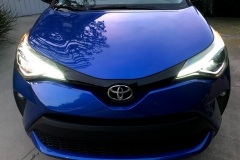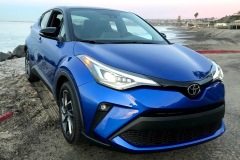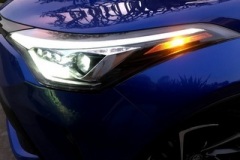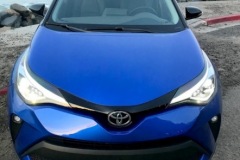Toyota’s Smallest Crossover
There is heavy competition in the compact crossover category (see the list of competitors we’ve tested at the end of this article), and Toyota is taking it very seriously. Since being launched as an all-new model 2018, the C-HR has already gone through two exterior styling updates for 2019 and 2020. You want fresh? Toyota has it for you, with the 2020 C-HR having a bold look with interesting angles. Heck, if you are going to stand-out in the crowd, interesting is good thing.

Non-Turbo, Front-Wheel Drive
The 2020 Toyota C-HR is powered by a 2.0-liter four-cylinder, naturally aspirated engine putting out 144 horsepower and 139 pound-feet of torque. The continuously variable transmission (CVT) is the only one offered and it drives the front wheels. All-wheel drive is not an option. With 91 octane fuel recommended, the EPA rates fuel economy on the C-HR at 27 mpg city/31 highway/29 combined. During our time in the C-HR, we drove 224 miles throughout Southern California, averaging 37.4 mpg in mostly highway driving. No doubt, the 0.34 coefficient of drag, created by the flat covered underbody and body stabilizing fins, led to increased aerodynamics. Fuel economy reported by Clean Fleet Report is non-scientific and represents the reviewer’s driving experience. Your numbers may differ.
Surpassing the EPA numbers is great, but there is a tradeoff. The C-HR powertrain–engine and transmission–is designed for efficiency and not performance; a leisurely saunter of 0-60 takes 11.0 seconds being a testament. If that sounds slow, it felt slow. Around town, selecting the Sport mode on the CVT provided more responsive acceleration, but the C-HR tackling a freeway entrance was less than scintillating.
Driving Experience: On the Road

The C-HR was nimble around tight corners, helped by the 18-inch alloy wheels shod with Dunlop SP Sport 225/50 all-season tires, both of which came standard on our upgraded Limited trim line. The C-HR’s 3,300 pounds was managed by front independent MacPherson struts with a multi-link rear suspension including stabilizer bars and hydraulic shocks. The C-HR feels solid on the road, with little buffeting from big rigs or unexpected gusts of wind. The electric power steering was smooth and solid. Overall, the C-HR absorbed road imperfections, was well-balanced, displayed limited body roll, and was easy to drive.
Stopping was straight and true, with no fading, from the front power-assisted ventilated discs and the solid rear disc brakes. The four-wheel anti-lock brakes, stability and traction control, brake assist and electronic brake force distribution complete the system.
Driving Experience: Exterior
The 2020 Toyota C-HR underwent a gentle exterior refinement that softened some of its abrupt angles. Toyota says their designers worked from the theme of “Distinctive Diamond,” which is to evoke thoughts of sophistication and strength–just like a diamond. They go on to say the 2020 C-HR is “sexy, muscular and edgy,” starting with the LED twin projector beam halogen headlights that wrap deep onto the front fenders. One thing that is immediately noticeable from the side elevation is how swept-back the angle is from the nose to above the windshield.

From the high-point on the roof, the only interruptions to a smooth surface are the color-keyed shark fin antenna and the uniquely designed spoiler over the deeply slanted hatch glass. The LED tail lights a have futuristic shape to them as they blend in with the cantilevered wing. As was noted in the opening, the C-HR has a bold look with a few interesting angles
The 2020 Toyota C-HR comes in six distinctive colors that include Blizzard Pearl, Supersonic Red and, like our test car, Blue Eclipse Metallic. The overall design is appealing and stands out in its class.
Driving Experience: Interior
Clean Fleet Report was driving the 2020 Toyota C-HR Limited, which is the highest trim level. The highly optioned Limited had front leather-trimmed heated seats, with the driver getting eight-way power (with lumbar), and the passenger getting six-way manual adjustments. The sport bolsters added both comfort and a snug fit, which made for comfortable seating.
The C-HR is rated to carry three adults in the rear seat, but we advise against it. The rear seat access took some contorting through interesting shaped door openings. Once in, it was a tight fit, even for two adults, as the seat back was too upright and the cushions needed a bit more support. But where the C-HR will shine, is dropping the 60/40 split bench rear seat and it becomes a great car for two taking a long weekend trip.

Toyota’s quality was present with a smartly designed dash layout that is simple and clean. The gauges, including a tachometer, were easy to read with white numbers on black faces. Clean Fleet Report is a big fan of radio knobs for volume and channel selecting, and Toyota didn’t disappoint. The automatic climate control is managed by buttons nicely placed below the radio. Subtle, but at the same time standing out, was the interior incorporating the “diamond” design theme noted earlier. This pattern can be found on the seats, ceiling, door panels and scuff plates, adding a bit of whimsy where such a thing is rarely found.
The C-HR Limited came with the Audio Plus option that upgraded the audio system to an 8.0-inch, high-resolution touch screen for the six-speaker AM/FM/HD/CD sound system that included SiriusXM, Apple CarPlay, Android Auto, and Amazon Alexa compatibility. Additional elements to the system were USB ports with iPod connectivity, Bluetooth streaming audio, voice recognition and hands-free telephone. Other nice interior features are a rear view camera, power windows and door locks and heated power outside mirrors with C-HR puddle lights.
Safety and Convenience
The 2020 Toyota C-HR is well-equipped with the Star Safety System, Toyota Safety Sense, and Safety Connect. Active and passive safety features include 10 air bags, vehicle stability and traction control, brake assist and smart stop technology. The advanced driver pre-collision technology includes lane departure alert, dynamic radar cruise control and pedestrian detection. Additional safety features include remote keyless entry, push button start/stop and a tire pressure monitoring system.
The 2020 C-HR has earned Good ratings from the Insurance Institute for Highway Safety (IIHS), while the US Government’s National Highway Traffic Safety Administration (NHTSA) has awarded it its highest rank of a Five Star rating.
Pricing and Warranties
The 2020 Toyota C-HR is offered in three models of LE, XLE, and Limited, ranging in base prices from $21,295 to $26,350. Clean Fleet Report’s C-HR Limited, with $965 in options, had a final MSRP of $28,435. This price includes the $1,120 delivery, processing and handling fee.
The 2020 C-HR comes with these warranties:
- Powertrain – Five years/60,000 miles
- Comprehensive – Three years/36,000 miles
- Maintenance Plan – Two years/25,000 miles
- Anti-perforation – Five years/Unlimited miles
- Roadside Assistance – Two years/Unlimited miles
Observations: 2020 Toyota C-HR Limited
Toyota’s smallest crossover SUV is working hard to stay current. Exterior refreshes in each of its first three years is a testament to what it takes to succeed in this highly competitive segment. Toyota not only wants to lure first time buyers to the brand, but retain its loyal Toyota owners. As more and more people are ditching sedans and moving into crossovers, Toyota hopes the C-HR will be on their shopping list.

The strong points about the C-HR are good fuel economy, a unique design with some wild color choices, a solid and comfortable ride and a good selection of standard convenience and safety features. The challenges are limited rearward visibility, which makes the blind spot monitor so important, a somewhat anemic engine and all-wheel drive not being available.
The strong points will most likely win out as the C-HR on the whole offers good, solid transportation.
Go into a Toyota dealer for a lengthy test drive and see if the C-HR fits your lifestyle and matches-up against the competition. The beauty of so many compact crossovers to choose from is the C-HR has to be an appealing choice.
Make sure to opt-in to the Clean Fleet Report newsletter (top right of page) to be notified of all new stories and vehicle reviews.
Whatever you buy, Happy Driving!
Related Stories You Might Enjoy—Crowded Subcompact Crossover Competition
Road Test: 2018 Mitsubishi Outlander Sport
Road Test: 2015 Chevrolet Trax
Road Trip: 2018 Ford EcoSport
Road Test: 2020 Fiat 500X
Road Test: 2016 Kia Soul EV
Road Test: 2020 Kia Soul X-Line
Road Test: 2016 Honda HR-V
Road Test: 2017 Jeep Renegade
Road Test: 2015 Buick Encore
Road Test: 2018 Nissan Rogue Sport
Road Test: 2019 Kia Niro Electric
Road Test: 2018 Mazda CX-3
Road Test: 2019 Subaru Crosstrek PHEV
Road Test: 2019 Subaru Forester
News: 2018 Nissan Kicks
Road Test: 2020 Hyundai Kona Electric
Road Test: 2019 Hyundai Kona Ultimate
Flash Drive: 2020 Mazda CX-30
Road Test: 2018 Kia Sportage
Disclosure:
Clean Fleet Report is loaned free test vehicles from automakers to evaluate, typically for a week at a time. Our road tests are based on this one-week drive of a new vehicle. Because of this we don’t address issues such as long-term reliability or total cost of ownership. In addition, we are often invited to manufacturer events highlighting new vehicles or technology. As part of these events we may be offered free transportation, lodging or meals. We do our best to present our unvarnished evaluations of vehicles and news irrespective of these inducements.
Our focus is on vehicles that offer the best fuel economy in their class, which leads us to emphasize electric cars, plug-in hybrids, hybrids and diesels. We also feature those efficient gas-powered vehicles that are among the top mpg vehicles in their class. In addition, we aim to offer reviews and news on advanced technology and the alternative fuel vehicle market. We welcome any feedback from vehicle owners and are dedicated to providing a forum for alternative viewpoints. Please let us know your views at publisher@cleanfleetreport.com.





14 thoughts on “Road Test: 2020 Toyota C-HR Limited”